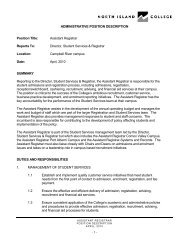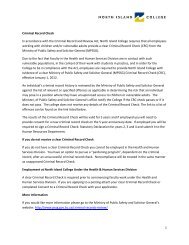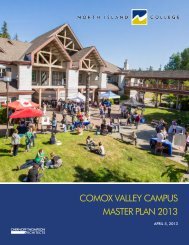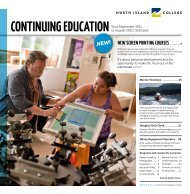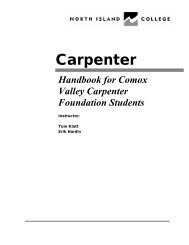North Island College - Ministry of Advanced Education - Government ...
North Island College - Ministry of Advanced Education - Government ...
North Island College - Ministry of Advanced Education - Government ...
- No tags were found...
You also want an ePaper? Increase the reach of your titles
YUMPU automatically turns print PDFs into web optimized ePapers that Google loves.
Institutional Accountability Plan and Report 2011/12Developmental ProgramsAs regional student preparedness levels continue to remain markedly below provincial averages, the<strong>College</strong>’s future is with students who require ever greater learning and life support throughindividualized attention in the classroom, in community and with Student Services.Demand for Adult Basic <strong>Education</strong> (ABE) programs remains strong at <strong>North</strong> <strong>Island</strong> <strong>College</strong> as is evidentby the enrolment patterns both on campus and <strong>of</strong>fsite within our outlying communities. The <strong>College</strong> hasstructured its ABE <strong>of</strong>ferings at the campuses to meet growing student demand by <strong>of</strong>fering prerequisitelevel ABE courses that support students’ transition to further post-secondary studies. To meet thisneed, NIC’s Developmental Department has timetabled courses in scheduled, continuous intake anddistance formats to allow for greater flexibility and choice for students.The <strong>College</strong> has also increased its ABE <strong>of</strong>ferings through the delivery <strong>of</strong> on-site ABE courses within ourrural communities. The Carpentry Access program (described further in the previous section) allowsstudents to complete preparatory courses that transition students directly into a Carpentry Foundationprogram. The <strong>College</strong> will continue to explore and develop similar trades and career program upgradingpathways to increase access to education and employment options for people living in our region. Onsiteprogramming is also being promoted through the development and signing <strong>of</strong> educationalagreements with First Nation communities. During the course <strong>of</strong> the 2011/12 instructional year,educational agreements have been signed with the Mowachaht/Muchalaht and Nuxalk First Nations. Inaddition, ABE courses are being <strong>of</strong>fered in Alert Bay at the Cormorant Adult Learning Centre and theDevelopmental Department has been working with Ahousaht to <strong>of</strong>fer ABE courses once again in thatcommunity.The <strong>College</strong>’s Access for Students with Disabilities Department continues to provide strong service tostudents in both instructional and service capacity. The Department has been working in collaborationwith community partners in Port Alberni to develop an Employment & <strong>Education</strong>al Transition programfor students with disabilities, including individuals with Fetal Alcohol Spectrum Disorder. The goal is to<strong>of</strong>fer this unique program during the 2012/13 academic year. The Department continues to holdcommunity advisory meetings to ensure that instructional programming meets the needs <strong>of</strong> futurelearners within the community. Demand for Access Services continues to rise for students with specialneeds seeking educational planning and adaptive technology support.Continuing <strong>Education</strong> and TrainingNIC’s Continuing <strong>Education</strong> and Training Division has seen an increase in programming over the lastthree years, with FTE’s varying according to the degree <strong>of</strong> program development versus programdelivery in any given year. As a cost-recovery division, staff is engaged in ongoing program developmentaligned with industry and regional labour market considerations. Program development has specificallyincreased beyond contract training and cost-recovery, non-credit certificates to now include costrecoverycredit programming.During 2011/2012, NIC’s Continuing <strong>Education</strong> and Training (CET) Division developed industry-specificoccupational skills training to address labour shortages across specific sectors. Programs weredeveloped to meet the needs <strong>of</strong> industry while providing students with an opportunity to access timelyoccupational skills training leading to employment. The majority <strong>of</strong> the programs were delivered on a28



